Ivan Yates is back and has reinvented himself as a trainer, adviser and guru for people who want to communicate a message through radio or television.
It’s a role he’s uniquely qualified for, given 20 years in national politics and a further dozen as a national broadcaster on both TV and radio.
He’s worn every hat and sat on every side of a table with a microphone on it or a seat with a camera pointed at it.
So what is does that experience bring to clients?
It’s 30 years of answering questions and 10 years of asking questions and knowing how TV and radio programmes are made
“What I offer is very specific. During lockdown I was very bored, very restricted and very little to do. I had deliberately walked away from full-time broadcasting, and wasn’t that interested in doing a whole lot more broadcasting.
“Basically, I sat down and I wrote 18,000 words of a course.
Answering and asking
“It’s 30 years of answering questions and 10 years of asking questions and knowing how TV and radio programmes are made.
“Know exactly what six minutes of airtime is on radio and television. Know exactly what a producer wants to get out of every interview.
“In politics, in marketing Celtic Bookmakers without a marketing budget, where my personality was taking on Paddy Power and the corporates, and then in bankruptcy and adversity, I was in the hotseat.
“Not every interview you do is sunshine and roses, there are difficult situations where it’s either very complex to explain it or, in retrospect, you wish it had gone differently.
“I’ve been exposed to 40 years of media spotlight from virtually every angle.
“I drill into what is your baggage, your backstory, how do you add value, what makes you unique.
Adding value
“A lot of people don’t know how they add value to their customers, and that is essential, whether you’re selling yoghurt or in politics. It’s a bit of a bootcamp - you might think you have answers, but you don't really have good answers and I can show up people.
“We do all the A-Z of preparation. On-air techniques. That’s everything from the green room (the waiting room for interviewees and guests). Should you drink tea, coffee, or water.
“Your body language, your eyes, smile, your hand gestures, all the distractions in a TV studio that you need to disregard. How to interrupt, how to parry and pivot a difficult binary question, the minutiae of detail.
Crisis management
“Then we get into crisis management.”
Here, he cites recent examples, such as Davy Stockbrokers, Gordon Elliott, the Beacon’s vaccines going to a school, Katherine Zappone in typical irreverent and provocative Yates fashion.
“This is a disaster situation that could threaten your career, your reputation. The advice form every PR firm is ‘keep the head down, and this too will pass’.
“I’m not in the PR game, and I’m saying that attitude is a disaster. You’ve got to embrace it, but in the right way and at the right time.
“I go through all the things you need to survive. Do you have the backbone and resilience to get through this even if people will think less of you.
“If you do, I’ll bring you through how to execute a seminal moment, that will take all the heat, leave no meat on the bone. I go through Golfgate, I’ll go through other disasters where people have survived, and show what was the key thing.”
Backlash
Yates has personal experience of a public and media backlash when he chose to enter bankruptcy in Wales following the collapse of Celtic Bookmakers, so he has walked that walk.
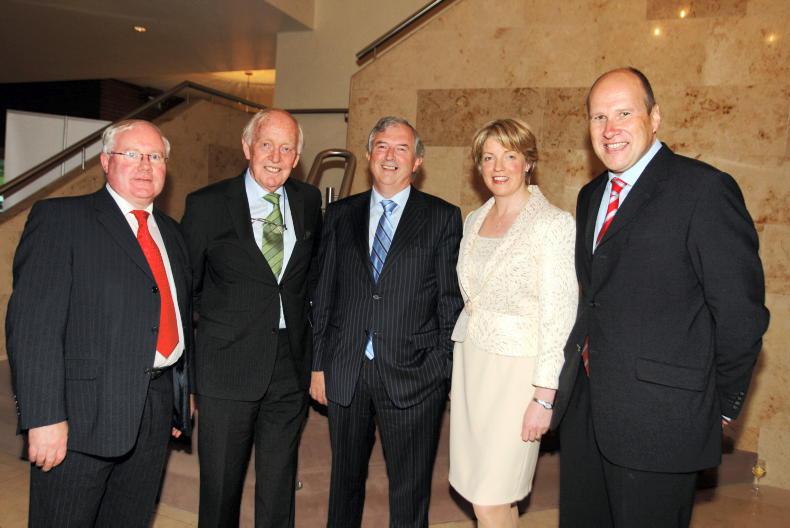
Ivan Yates (far right) with then-Minister for Agriculture Brendan Smith (on left) and fellow former agriculture ministers Michael O’Kennedy and Mary Coughlan at the IFA dinner in Dublin to mark the retirement of Michael Berkery (centre) after 25 years as the association’s general secretary.
Seismic
A keen political analyst, he describes Sinn Féin’s electoral breakthrough in 2020 as “seismic”, and thinks they remain poised to lead the next government. “The demand for change from voters wasn’t fulfilled, that potent force is still there.”
He feels that farmers need to be aware of, and concerned about, changing trends in Irish society.
“On issues like, for instance veganism v red meat consumption, there are three distinct demographics emerging - more urban than rural, more female than male, and definitely younger. They are far less likely to eat red meat, they place huge importance on environmental and climate change issues, and animal welfare is important to them.
“Big old parties think they can straddle the entire spectrum, and they end up straddling none of the spectrum. Sinn Féin don’t try to do that; they are very clear about who their target audience is. ‘Are we for big business? No, we’re for the worker. Are we for less corporate taxes if that means more jobs? No we are definitely for more corporate taxes and social justice. Are we for the landlord or the tenant? We’re for the tenant.’
“So the situation is not like the catch-all party that Fianna Fáil were under Charlie Haughey. Things have changed, there is a polarisation of opinion on all these topics, and the demographics are moving in favour of those positions.”
The changing sand of time for farming
Does Ivan think the IFA, as a farmer organisation that represents farmers of all scale, intensity and enterprises, is in danger of falling into that same trap of representing no-one? He doesn’t think the analogy between a political party and a farmer organisation fully works.
“The issue for all the farm organisations is how effective are they at representing their members interests, as opposed to general popularity. So, therefore, I think there is a benefit and a strength in size, because actually the issue is not the competing popularity amongst the small percentage of the population that are farmers, it is actually about being effective in putting their message across in the public domain.”
So how does farming retain the social licence it needs from the general public to produce food with all that brings?
“When I was Minister for Agriculture in the mid-90s I could see massive change had already occurred from when I started in politics in the 15 years earlier. As a proportion of the electorate, the farming vote was becoming less significant. The public’s attention on agri issues was declining. There had been all sorts of agri content in the mainline media. Over the years, it has become siloed and ghettoised. It’s all put into an agri programme now. Therefore, it’s no longer of mainstream interest, it’s of sectional interest.
“That has accelerated; I don’t believe agriculture is even on the radar of a newly appointed news editor of a national newspaper. Food, sustainability and agriculture in the context of the environment is all that’s on their agenda.
“The media is the least of farmers’ problems, there’s actually huge societal change underpinning this. What would have passed as acceptable answers in relation to nitrates, for instance, in 10 years’ time will be harder to sell. The one things politicians can do is count, and farmers’ numbers are steadily falling as a percentage of the overall population.
“Let’s take other examples - hare-coursing, foxhunting, fishing, shooting, traditional country pursuits. People would have once said, ‘I wouldn’t do those things myself, but I have a tolerance and respect for rural traditions.’
“Now, you’re going to see cancel culture emerging right across all these things where people say - ‘No, no, not only would I not do it, it’s so abhorrent, I won’t allow you to do it either.”
Politician, businessman, broadcaster - the three-act play of Ivan Yates’s career to date
In June 1981, Ivan Yates was catapulted on to the national stage when he became the youngest TD in the country.
Elected for Fine Gael in the Wexford constituency, he never lost his seat, being re-elected six more times over the following 20 years.
In 1994, following the formation of the rainbow coalition, he became minister for agriculture. His tenure was dominated by the emergence of BSE in the Irish herd, which hammered the beef sector.
Prior to entering politics, he had attended Gurteen Agricultural College and taken over the family farm. His family also had business interests, running a general hardware and wool merchants by the banks of the Slaney in Enniscorthy.
Long seen as a future party leader and Taoiseach, Yates surprised many by announcing that he wouldn’t contest the Fine Gael leadership when it became vacant in 2001, following John Bruton’s resignation.
Rather, at just 41 years of age, he announced he would be leaving politics at the end of that Dáil’s lifespan and he did not contest the following General Election in 2002.
Expanding business
He then concentrated on his expanding bookmakers business. Celtic Bookmakers grew rapidly in the next few years, with 64 shops across Ireland and in Wales at peak.
However, the economic crash destroyed the business and in 2011 it went into receivership.
By this time, Yates had established a new career as a broadcaster. He began with Newstalk in 2009, presenting the Morning Show and then The Hard Shoulder in the peak early evening slot.
Yates also presented the Tonight political show on Virgin for over a decade. He took time off in 2012 to domicile in Wales to comply with the requirements to file for bankruptcy in that jurisdiction.
From minister for farmers to mentor?
Ivan Yates believes farm leaders might benefit from his bootcamp on how to better present their case and their perspective in the national media.
It would be an unusual sight - the former minister mentoring the successors of John Donnelly, Alan Gillis, Tom O’Dwyer and Frank Allen, who he jousted with in the 1990s. But his life has uniquely prepared him for such a role. I’m reminded of the line in the classic film The Shawshank Redemption - “Andy Dufresne, who crawled through a river of shit and came out clean on the other side.”
Ivan Yates has walked the walk, he’s talked the talk, and he is now telling the tale to others.
Ivan Yates is back and has reinvented himself as a trainer, adviser and guru for people who want to communicate a message through radio or television.
It’s a role he’s uniquely qualified for, given 20 years in national politics and a further dozen as a national broadcaster on both TV and radio.
He’s worn every hat and sat on every side of a table with a microphone on it or a seat with a camera pointed at it.
So what is does that experience bring to clients?
It’s 30 years of answering questions and 10 years of asking questions and knowing how TV and radio programmes are made
“What I offer is very specific. During lockdown I was very bored, very restricted and very little to do. I had deliberately walked away from full-time broadcasting, and wasn’t that interested in doing a whole lot more broadcasting.
“Basically, I sat down and I wrote 18,000 words of a course.
Answering and asking
“It’s 30 years of answering questions and 10 years of asking questions and knowing how TV and radio programmes are made.
“Know exactly what six minutes of airtime is on radio and television. Know exactly what a producer wants to get out of every interview.
“In politics, in marketing Celtic Bookmakers without a marketing budget, where my personality was taking on Paddy Power and the corporates, and then in bankruptcy and adversity, I was in the hotseat.
“Not every interview you do is sunshine and roses, there are difficult situations where it’s either very complex to explain it or, in retrospect, you wish it had gone differently.
“I’ve been exposed to 40 years of media spotlight from virtually every angle.
“I drill into what is your baggage, your backstory, how do you add value, what makes you unique.
Adding value
“A lot of people don’t know how they add value to their customers, and that is essential, whether you’re selling yoghurt or in politics. It’s a bit of a bootcamp - you might think you have answers, but you don't really have good answers and I can show up people.
“We do all the A-Z of preparation. On-air techniques. That’s everything from the green room (the waiting room for interviewees and guests). Should you drink tea, coffee, or water.
“Your body language, your eyes, smile, your hand gestures, all the distractions in a TV studio that you need to disregard. How to interrupt, how to parry and pivot a difficult binary question, the minutiae of detail.
Crisis management
“Then we get into crisis management.”
Here, he cites recent examples, such as Davy Stockbrokers, Gordon Elliott, the Beacon’s vaccines going to a school, Katherine Zappone in typical irreverent and provocative Yates fashion.
“This is a disaster situation that could threaten your career, your reputation. The advice form every PR firm is ‘keep the head down, and this too will pass’.
“I’m not in the PR game, and I’m saying that attitude is a disaster. You’ve got to embrace it, but in the right way and at the right time.
“I go through all the things you need to survive. Do you have the backbone and resilience to get through this even if people will think less of you.
“If you do, I’ll bring you through how to execute a seminal moment, that will take all the heat, leave no meat on the bone. I go through Golfgate, I’ll go through other disasters where people have survived, and show what was the key thing.”
Backlash
Yates has personal experience of a public and media backlash when he chose to enter bankruptcy in Wales following the collapse of Celtic Bookmakers, so he has walked that walk.

Ivan Yates (far right) with then-Minister for Agriculture Brendan Smith (on left) and fellow former agriculture ministers Michael O’Kennedy and Mary Coughlan at the IFA dinner in Dublin to mark the retirement of Michael Berkery (centre) after 25 years as the association’s general secretary.
Seismic
A keen political analyst, he describes Sinn Féin’s electoral breakthrough in 2020 as “seismic”, and thinks they remain poised to lead the next government. “The demand for change from voters wasn’t fulfilled, that potent force is still there.”
He feels that farmers need to be aware of, and concerned about, changing trends in Irish society.
“On issues like, for instance veganism v red meat consumption, there are three distinct demographics emerging - more urban than rural, more female than male, and definitely younger. They are far less likely to eat red meat, they place huge importance on environmental and climate change issues, and animal welfare is important to them.
“Big old parties think they can straddle the entire spectrum, and they end up straddling none of the spectrum. Sinn Féin don’t try to do that; they are very clear about who their target audience is. ‘Are we for big business? No, we’re for the worker. Are we for less corporate taxes if that means more jobs? No we are definitely for more corporate taxes and social justice. Are we for the landlord or the tenant? We’re for the tenant.’
“So the situation is not like the catch-all party that Fianna Fáil were under Charlie Haughey. Things have changed, there is a polarisation of opinion on all these topics, and the demographics are moving in favour of those positions.”
The changing sand of time for farming
Does Ivan think the IFA, as a farmer organisation that represents farmers of all scale, intensity and enterprises, is in danger of falling into that same trap of representing no-one? He doesn’t think the analogy between a political party and a farmer organisation fully works.
“The issue for all the farm organisations is how effective are they at representing their members interests, as opposed to general popularity. So, therefore, I think there is a benefit and a strength in size, because actually the issue is not the competing popularity amongst the small percentage of the population that are farmers, it is actually about being effective in putting their message across in the public domain.”
So how does farming retain the social licence it needs from the general public to produce food with all that brings?
“When I was Minister for Agriculture in the mid-90s I could see massive change had already occurred from when I started in politics in the 15 years earlier. As a proportion of the electorate, the farming vote was becoming less significant. The public’s attention on agri issues was declining. There had been all sorts of agri content in the mainline media. Over the years, it has become siloed and ghettoised. It’s all put into an agri programme now. Therefore, it’s no longer of mainstream interest, it’s of sectional interest.
“That has accelerated; I don’t believe agriculture is even on the radar of a newly appointed news editor of a national newspaper. Food, sustainability and agriculture in the context of the environment is all that’s on their agenda.
“The media is the least of farmers’ problems, there’s actually huge societal change underpinning this. What would have passed as acceptable answers in relation to nitrates, for instance, in 10 years’ time will be harder to sell. The one things politicians can do is count, and farmers’ numbers are steadily falling as a percentage of the overall population.
“Let’s take other examples - hare-coursing, foxhunting, fishing, shooting, traditional country pursuits. People would have once said, ‘I wouldn’t do those things myself, but I have a tolerance and respect for rural traditions.’
“Now, you’re going to see cancel culture emerging right across all these things where people say - ‘No, no, not only would I not do it, it’s so abhorrent, I won’t allow you to do it either.”
Politician, businessman, broadcaster - the three-act play of Ivan Yates’s career to date
In June 1981, Ivan Yates was catapulted on to the national stage when he became the youngest TD in the country.
Elected for Fine Gael in the Wexford constituency, he never lost his seat, being re-elected six more times over the following 20 years.
In 1994, following the formation of the rainbow coalition, he became minister for agriculture. His tenure was dominated by the emergence of BSE in the Irish herd, which hammered the beef sector.
Prior to entering politics, he had attended Gurteen Agricultural College and taken over the family farm. His family also had business interests, running a general hardware and wool merchants by the banks of the Slaney in Enniscorthy.
Long seen as a future party leader and Taoiseach, Yates surprised many by announcing that he wouldn’t contest the Fine Gael leadership when it became vacant in 2001, following John Bruton’s resignation.
Rather, at just 41 years of age, he announced he would be leaving politics at the end of that Dáil’s lifespan and he did not contest the following General Election in 2002.
Expanding business
He then concentrated on his expanding bookmakers business. Celtic Bookmakers grew rapidly in the next few years, with 64 shops across Ireland and in Wales at peak.
However, the economic crash destroyed the business and in 2011 it went into receivership.
By this time, Yates had established a new career as a broadcaster. He began with Newstalk in 2009, presenting the Morning Show and then The Hard Shoulder in the peak early evening slot.
Yates also presented the Tonight political show on Virgin for over a decade. He took time off in 2012 to domicile in Wales to comply with the requirements to file for bankruptcy in that jurisdiction.
From minister for farmers to mentor?
Ivan Yates believes farm leaders might benefit from his bootcamp on how to better present their case and their perspective in the national media.
It would be an unusual sight - the former minister mentoring the successors of John Donnelly, Alan Gillis, Tom O’Dwyer and Frank Allen, who he jousted with in the 1990s. But his life has uniquely prepared him for such a role. I’m reminded of the line in the classic film The Shawshank Redemption - “Andy Dufresne, who crawled through a river of shit and came out clean on the other side.”
Ivan Yates has walked the walk, he’s talked the talk, and he is now telling the tale to others.




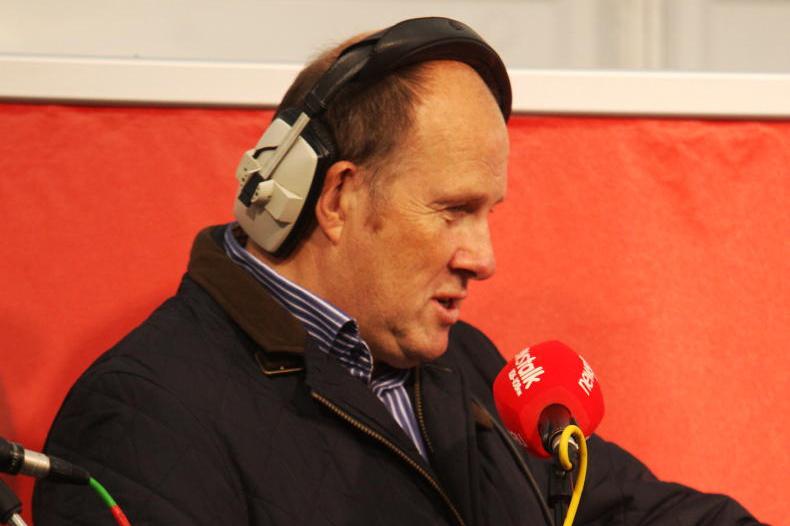

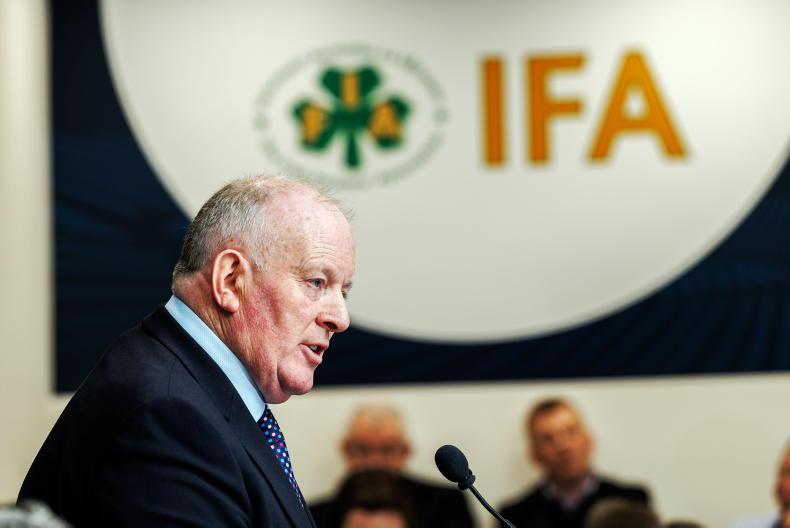

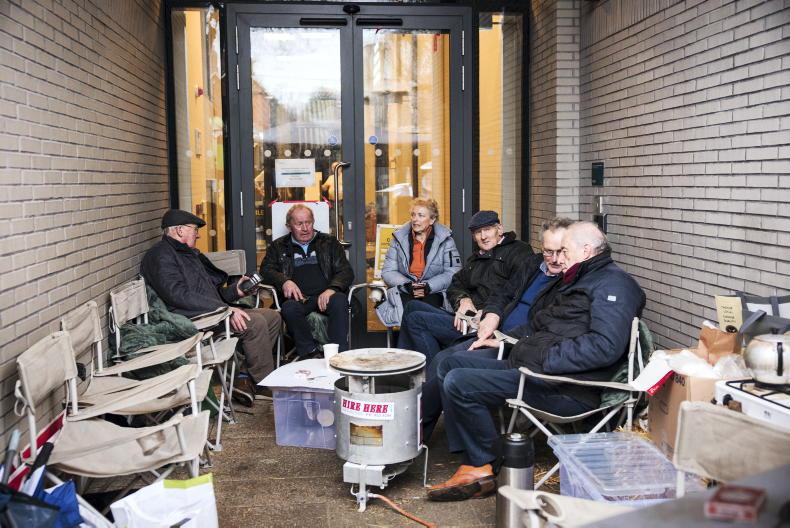
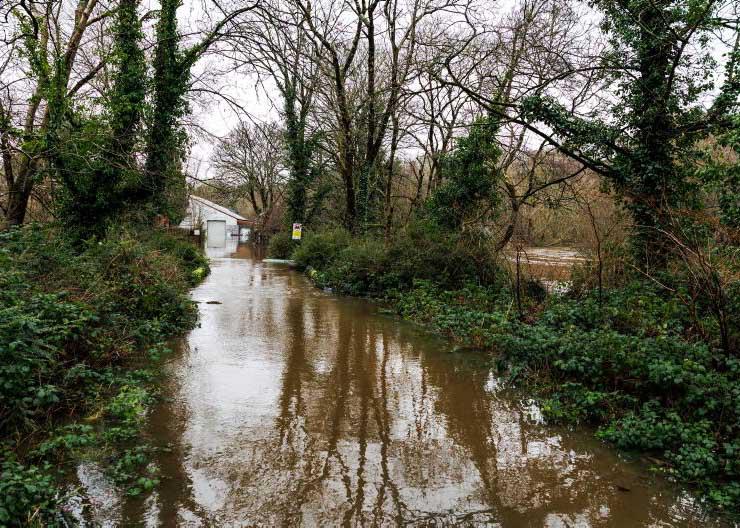

SHARING OPTIONS